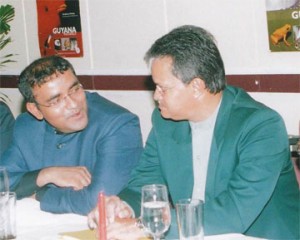PSC secures CIDA funding for capacity building
Stabroek Business has learnt that a meeting between government and the Private Sector Commission (PSC) to discuss tax reform measures is likely to take place in the near future.

PSC Chairman Captain Gerry Gouveia told Stabroek Business earlier this week that while “no definitive date has as yet been set for a meeting he believed that the two sides could meet to discuss tax reform measures “before the end of this year.”
Gouveia said that the discussions were likely to cover personal and corporate taxes among others but pointed out that the engagement did not necessarily signal that the long-awaited tax reforms for which the private sector has been lobbying were imminent. “We prefer to see the forthcoming engagement as the continuation of a process since discourses between the private sector and the government on the issue of tax reform and other measures have been taking place at several levels over time,” Gouveia told Stabroek Business.
However, despite the deliberate efforts by the PSC Chairman to treat the meeting as what he described as “part of a process,” any formal meeting between the two sides to specifically discuss tax reforms is bound to be seen as an important breakthrough in public/private sector relations. The two sides have seen a protracted period of differences over tax reforms which have, on occasion, been characterized by acrimonious exchanges between President Bharrat Jagdeo and private sector officials.
Gouveia told Stabroek Business that the PSC believed that a hastening of the process towards tax reform could lead to “a significant invigoration of the local business environment and the accrual of more revenue to the public treasury.”
According to Gouveia both the government and the private sector recognize the need for tax reform measures as an incentive for encouraging investment in the economy. He said that the challenge in any discussion lay in persuading the government that lower levels of taxation will lead to an expansion of business activity that will have a knock-on effect on tax revenues.”
The PSC Chairman told Stabroek Business that the Com-mission accepted the validity of government’s concerns about tax reform given its own responsibilities “to fund and, in some cases, subsidize areas like the health, electricity and water sectors.”
According to Gouveia discourses between the private sector and the government on tax reform have been ensuing at several levels including at the level of the National Competitiveness Council. “It really is a question of both sides understanding each other’s perspectives on tax reform and, through discussion, creating an environment in which that reform process can proceed in a manner that benefits the private sector while ensuring that revenues remain available to the public treasury for funding social programmes and essential services.”
Meanwhile Gouveia told Stabroek Business that the PSC was seeking both to broaden the private sector agenda for discussions with the government as well as to strengthen its capacity to effectively engage in those discussions. He said that apart from taxation the PSC “would be seeking earnestly to enter into more involved and results-oriented discussions” on other issues including “removing the existing stumbling blocks to the creation of a more convivial investment climate.”
“One has to admit that there are a number of legitimate concerns about the investment climate including what is often a cumbersome bureaucracy. But that is not the only problem. What we have been unable to do is to successfully address the perception that exists among many potential overseas investors that there are still a number of impediments to doing business in Guyana. Apart from the issue of crime there is, somehow, the perception that things still move far too slowly and that political and other differences are ever present in the society. Whether these are real or whether they are simply perceptions we have to remove them if we are to realize higher levels of external investment,” he said.
Meanwhile, the PSC Chairman disclosed that in an effort to strengthen its institutional capacity the PSC had secured funding from the Canadian International Deve-lopment Agency (CIDA) to fund the recruitment of trained staff for its secretariat. “What we have found is that the weaknesses in our human resource capacity have inhibited our capacity to engage government and other institutions on specialized issues. I believe that if we are to contribute more meaningfully to those engagements and ultimately derive more from them we need to develop a capable technical team. The problem is that the PSC executive comprises fill-time businessmen and we need the technical suppor”, Gouveia said.
Asked whether he accepted that there was a public perception that relations between the public and private sectors had become confrontational Gouveia said that what he did accept was that “differences of opinion arise between business and government on matters that are of critical interest to both sides.” He said that those differences were “often a reflection of the efforts of the PSC’s efforts to insert itself into processes that were critical to the interests of the business sector and, by extension, the social and economic interests of the country. That is by no means a bad thing,” he added.
Gouveia told Stabroek Business that there were several examples of “sustained and meaningful collaboration” between the PSC and state institutions. “One of those areas is the crucial area of security. We meet periodically with representatives of the security institutions to discuss issues of crime and national security and how we can work together to create a climate that helps to build investor confidence and confidence within the local business community.”
Meanwhile Gouveia told Stabroek Business that there could be no question that the PSC would engage the government on matters of interest to the business community “with anything less than frankness.” According to Gouveia the PSC has no intention of “removing itself from pursuing its legitimate role as an important player in the development of the economy and the society as a whole.”





